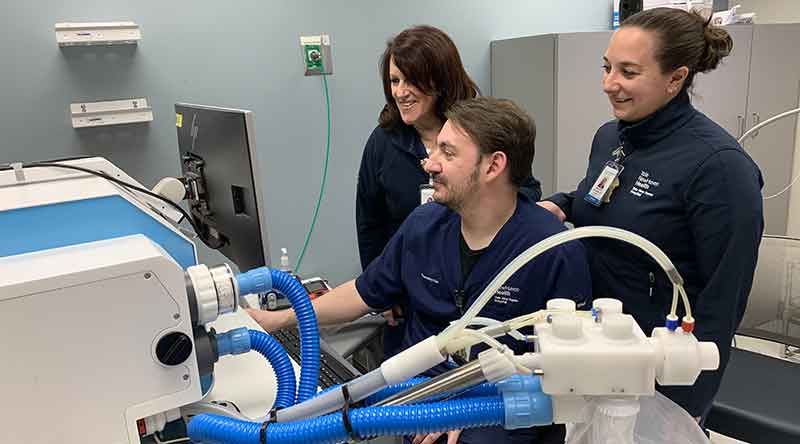
From left, respiratory therapists in YNHH’s Pulmonary Function Testing Laboratory (PFT) Judith Dinneen, Labinot Mersini and Marjorie Cullinan, PFT operations manager, recently checked results of a spirometry test. In February, Yale New Haven Health adopted an equation for interpreting PFT results that does not factor in patients’ race or ethnicity.
YNHHS eliminates race, ethnicity in evaluating lung-function test results
As part of a commitment to providing equitable patient care, Yale New Haven Health and Yale School of Medicine (YSM) no longer use race or ethnicity in interpreting the results of a common lung function test.
The spirometer, a device that measures the amount of air a person can exhale, is often used to test for asthma, chronic obstructive pulmonary disease and other conditions that affect breathing. To evaluate spirometry test results, clinicians worldwide have historically used an equation with “corrective factors” that are based partly on a patient’s reported race or ethnicity. According to this equation, Black patients have 10 percent to 15 percent less lung capacity than their white counterparts, and Asian patients have 4 percent to 6 percent less capacity.
Research has shown that because this equation assumes lower lung capacity for certain racial and ethnic groups, clinicians might miss a medical condition that’s causing breathing problems.
“With certain ethnicities being predicted to have lower lung volumes than others, people of similar ages, sizes and lung measurements would have different results to determine the severity of their illness based on the ethnicity factor,” said respiratory therapist Marjorie Cullinan, operations manager, Yale New Haven Hospital Pulmonary Function Testing.
As a result, these patients don’t always receive the diagnoses and treatments they need.
Last March, the American Thoracic Society and European Respiratory Society issued a joint recommendation to use an equation that no longer considers race or ethnicity in interpreting spirometry results. Thanks to the efforts of YNHHS’ Office of Health Equity & Community Impact, Pulmonary Function Testing Laboratory workgroup and Enterprise Quality and Care Signature, YNHHS and YSM implemented this race-neutral equation Feb. 27.
Using race and ethnicity to “correct” lung function is based on theories of “inferior” biologic racism dating from the 1700s, according to Pnina Weiss, MD, medical director, Pediatric Pulmonary Function Laboratory and professor of Pediatrics (pulmonary, allergy, immunology and sleep medicine), YSM.
“It ignores the critical contributions of environmental factors such as air pollution and cigarette smoke; access to medical care; and premature birth that disproportionally impact the lung health of marginalized populations, resulting in inadequate treatment,” Dr. Weiss said. “Adopting race-neutral reference values is the right thing to do; it is one small step towards social justice and health equity.”
The pulmonary function testing change is part of ongoing efforts to identify and mitigate racial and ethnic bias in lab and diagnostic testing across YNHHS and YSM, said Lou Hart, MD, medical director of Health Equity, YNHHS, and assistant professor of Pediatrics (hospital medicine), YSM. The ultimate goal is to eliminate healthcare disparities that can lead to differences in treatment and outcomes based on patients’ race, ethnicity, gender, socioeconomic status and other factors.

